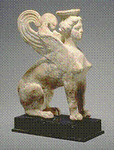I was going to skip reading those posts--the mere word "poetry" is enough to deflect my attention to other things. I've never been drawn to poetry per se. In college I was an English major and, in that capacity, had to read and analyze a lot of poetry. I've never read poetry for entertainment . . . even now, reading poetry feels like an "assignment." Hence, I avoid it.
However, driven by my compulsive side as well as my desire to honor another writer's oeuvre, I went ahead and read the poetry postings. They started me thinking about poetry.
I realized that despite my lack of interest in poetry, ironically I have written poems from time to time--mostly following periods of upheaval or tragedy. Considering my own impulse, plus the continuing drive many people feel to write poetry, as well as the popularity of songs, I've realized that humans have a fundamental need for poetry.
(Song lyrics are poems, as strange as that seems for some of them...I recall a hit song from my high school years, "Wild Thing" by The Troggs, which seemed to consist of the only four lines, reiterated endlessly: Wild thing / Wild thing / You make my heart sing / You make everything groovy. . . . n.b.: I just checked on Wikipedia and found I am wrong--there actually are several more verses, but all that stays in my memory are the lines I quoted.)
There are poems I like, all of them traditional verse. My favorite poem is Dover Beach by Matthew Arnold (which I first read in high school). Wistful, melancholy, existentialist, and lovely, especially the last lines:
Ah, love, let us be true
To one another! for the world, which seems
To lie before us like a land of dreams,
So various, so beautiful, so new,
Hath really neither joy, nor love, nor light,
Nor certitude, nor peace, nor help for pain;
And we are here as on a darkling plain
Swept with confused alarms of struggle and flight,
Where ignorant armies clash by night.
The words in William Blake's poem The Tiger always fascinated me with their rhythm and flow, but I never really understood what it meant. I'm pretty sure it's one of the poems I had to analyze in college years ago, but the analysis is gone from memory; only the words remain. The words are mesmerizing, however, especially the first and last verse, which are the same:
Tiger, tiger, burning bright
In the forests of the night,
What immortal hand or eye
Could frame thy fearful symmetry?
(http://www.bartleby.com/101/489.html)
Another fragment of verse that has stayed in my memory is by Byron. On searching for the lines to quote them here, I was surprised to discover they are not from a stand-alone poem--rather, they're excerpted from the ending of Byron's long poem Childe Harold's Pilgrimage:
There is a pleasure in the pathless woods,-- Childe Harold’s Pilgrimage, Canto iv. Stanza 178.
There is a rapture on the lonely shore,
There is society where none intrudes,
By the deep Sea, and music in its roar . . . .
(http://www.gutenberg.org/dirs/etext04/chpl10h.htm)
I won't try to answer Stewart's question ("What is poetry? or at least what is it today?"). As a non-fan of most poetry, I'm not qualified to pass judgment on that. All I can say is, I know it when I hear it, and I know what I like. Most poetry I've liked is in a traditional style; it need not rhyme, but it must have a noticeable rhythm, and beautiful language that captures strong emotions and/or memorable moments.
After all this, I've realized that perhaps I should try reading some poetry from time to time. Maybe it's something I needed to grow into, and maybe I'm finally ready for it . . . .




3 comments:
For me, the rhythm is a very important part. But some free verse poems have difficult rhythms that don't leap out at you at first, that you have to read several times and almost impose your own rhythm. Maybe that's weak as poetry goes, but sometimes it can be quite effective on a personal level.
I think well written poetry is wonderful. As you saw from my post though, my concern is how quickly people who would never dream about writing anything resembling prose do not think twice about throwing down their emotions on a sheet of paper and holding it up for all to read. If it is their emotions, and if they've been honest, then it must be valuable after all.
Good posting...and I think there is a need for poetry in our world. I just don't enjoy a good deal of popular contemporary poetry.
Thanks, Charles and Stewart, for your comments. Stewart, I agree with you--it's ironic that people who'd never dream of trying to write prose will attempt to write poems, with no idea of what they're doing. Poetry is the most difficult writing discipline to master. On the other hand, perhaps such attempts prove people instinctively recognize that poetry expresses emotion better than other forms of writing.
Post a Comment